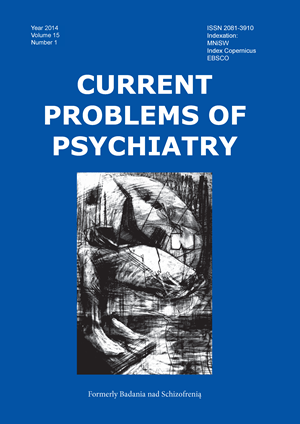Rodzina alkoholowa i jej szkodliwy wpływ na dzieci
Słowa kluczowe:
uzależnienie współuzależnienie, Zespół Dorosłych Dzieci Alkoholików (DDA), doświadczenia traumatyczne, terapia DDAAbstrakt
Wiele osób w naszym społeczeństwie wzrastało w rodzinach alkoholowych – jest to doświadczenie trudne i często traumatyczne dla młodego, wrażliwego człowieka. Dzieci nie potrafią się bronić i nie rozumieją dlaczego są pozbawione szacunku i uwagi. Ich dorosłe życie emocjonalne jest ograniczane przez liczne złe wspomnienia, strach, smutek i złość. Ponieważ większość Dorosłych Dzieci Alkoholików nie zdaje sobie sprawy ze związku ich dzieciństwa i niepowodzeń w życiu dorosłym, tylko część z nich decyduje się na rozpoczęcie terapii.
Bibliografia
1. Mellibruda, J.O zjawisku krzywdzenia dzieci w rodzinie czyli długa historia krzywdzenia, krótka historia pomagania. [The phenomenon of hurt children in a family – a long story of harm, a short story of help]. Niebieska Linia. [Blue Line].2001;2: 6-9.
2. Skrzypczyk, W.: Być dzieckiem alkoholika [Being an Alcoholic’s Child]. Świat Problemów. 2008; 12: 4-8.
3. James B. Treating Traumatized Children. Boston: Lexington Books/Macmillan; 1989.
4. Karasowska, A. Krzywdzenie dzieci w rodzinie alkoholowej [Harm of children in an alcoholic family]. Dziecko krzywdzone. Teoria, badania, praktyka [The Hurt Child. Theory, Research, Practice]. 2004;8: 6-17.
5. Widera-Wysoczańska, A. Zdrowotne konsekwencje chronicznego urazu doznanego w dzieciństwie [Chronic childhood trauma and its influence on health]. W: G. Dolińska-Zygmunt red. Podstawy psychologii zdrowia [Basics of Psychology of Health].Wrocław: Uniwersytet Wrocławski; 2001.s.227-242.
6. Gąsior, K. Czynniki zagrażające rozwojowi dzieci w rodzinie z problemem alkoholowym na przykładzie Dorosłych Dzieci Alkoholików [Factors that threaten the development of children in an alcoholic family – the case of Adult Children Of Alcoholics]. Alkoholizm i Narkomania [Alcoholism and Drug Addiction].2008;3:247-262.
7. Dąbkowska, M. Wpływ traumatycznych doświadczeń na zdrowie psychiczne dzieci i młodzieży [Trauma influence on the mental health of children and young people]. Psychiatria w Praktyce Ogólnolekarskiej [Psychiatry in General Practice].2006;4: 161-164.
8. Korzeniowski, L., Pużyński, S. Encyklopedyczny Słownik Psychiatrii [Encyclopedia of Psychiatric Terms]. Warszawa: Państwowy Zakład Wydawnictw Lekarskich; 1986.
9. Jona, I. Zespół Stresu Pourazowego DDA’ [Post-traumatic Stress Disorder in ACOA]. Świat Problemów [The World of Problems].1997;10:3-4.
10. Ryniak, J., Świątek, L. Diagnoza osób współuzależnionych [A diagnosis of co-addicted people], Terapia Uzależnienia i Współuzależnienia [Therapy of Addiction and Co-addiction].2008;3:5-7.
11. Klasyfikacja zaburzeń psychicznych i zaburzeń zachowania w ICD-10. Badawcze kryteria diagnostyczne [The ICD-10 Classification of Mental and Behavioural Disorders. Research Diagnostic Criteria].Kraków-Warszawa: Instytut Psychiatrii i Neurologii; 1998.
12. Sobolewska, Z., Gąsior K.Psychoterapia DDA podstawowe założenia [Psychotherapy of ACOA – basic assumptions]. Terapia Uzależnienia i Współuzależnienia [Therapy of Addiction and Co-addiction]. 2007;74-76.
13. Sobolewska, Z. Czy potrzebują terapii i jakiej? [Do they need therapy and what type?], Świat Problemów [The World of Problems].1997;10: 13-16.
14. Czabała, J. Cz. Czynniki leczące w psychoterapii [Healing Factors in Psychotherapy]. Warszawa: PWN; 2006.
15. Heaton, J.A.Building Basic Therapeutic Skills. San Francisco: Jossey-Bass; 1988.
16. Yalom, I. The Gift of Therapy. Perennial: 2003.
17. Kottler, J.A. On Being a Therapist. Jossey-Bass. 4th Edition; 2010.


